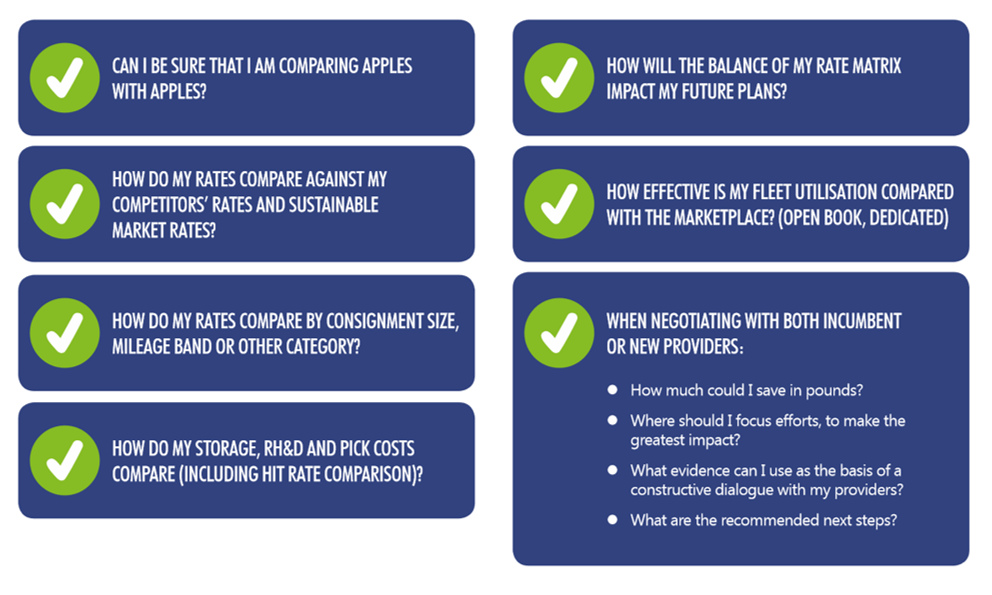In other blog posts we’ve already addressed the question How you know if you are getting value for money from your transport provider? This post addresses the questions of when the right time is to tender, what the process is, and how benchmarking can help answer the questions on many FMCG Logistics Directors minds.
When Is the right time?
Typically, logistics directors tend to consider renewing transport contracts, in isolation, 6 months before any action is taken, or 12-18 months if as part of a wider network solution.
With the events of this past year, many factors have changed, such as your activity profile by channel and major customer, your drop sizes and consolidation opportunities, and not forgetting the implications for your 3PL's network and their own pressures to protect their network-wide profitability.
Running a benchmark activity such as the GSI™ before you absolutely need to, means you will have a clear idea of the likely benefits or challenges of change. This vital insight will help you plan who to get the most from any tender process and help you consider whether you should simply seek to renew, or find an alternative solution.
When existing service costs more
It can be advantageous to run a benchmark at almost any time or following any significant change. For example, when a very large consumer goods supplier who regularly employs the GSI™ benchmark service, wished to renew their existing contract. When they initially approached their provider they were told that it was not possible to improve the quality and service currently being provided without increasing the cost. Neither was it possible to improve on their KPIs. This supplier turned to Simply Supply Chain and the GSI™ in order to answer the question, “Are we getting as good value as we can from our 3PL?”.

The answer was that this large FMCG supplier was paying 34% more than they should have been with its current 3PL.
Armed with this information the supplier engaged in re-committing to a short-term contract, but used the benchmark data to kick off a tender process for the next renewal date. This information formed the starting point to resolve a number of underlying issues and find the right solution in time for the renewal.
To enable early renewal
Some FMCG suppliers look to re-negotiate terms during their long-term contract. For example, at year three in a five-year contract they take the opportunity to evaluate the current service. As a result, they offer to extend the contract – beyond its original five-year date – but use the information from the GSI™ to improve service levels and/or cost. As a result, the supplier can realise better results sooner, and the logistics provider is pleased to secure a longer-term commitment, earlier. It’s a win-win situation for everyone concerned.
Periodic review
Alternatively, many of Simply Supply Chain’s clients choose to undertake a GSI™ benchmark periodically. This allows them to check details if their profile has changed, and to ensure they’re getting the value that their providers have promised.
Solid evidence to use for negotiations
The results of the GSI™ benchmark gives logistics directors solid evidence on which to base negotiations with their 3PL. The benchmark can be a means to an end – it can provide the data necessary to re-negotiate a 3PL contract for a one-off instance.
The benchmark indicates areas for improvement. It’s important to note, that 3PLs will seldom be able to achieve the benchmark rate in one negotiation. However, with each benchmark they undertake, they are able to narrow the gap. Subsequent benchmarks help FMCG suppliers identify other areas to help improve the cost base. The detail allows them to identify areas of weakness that they can work on, with their transport provider, to reduce the cost – through collaborative initiatives rather than cutting margin.
CONCLUSION
- NOW could be the right time, with costs rising and network activity profiles changing, your current 3PL many not be as right for your business as it was when you last reviewed their suitability.
- The need for cost-effective transport has become a basic necessity, rather than a source of competitive advantage – the challenges of a continually-evolving customer requirement as traditional channels are replaced by omni-channel services and new market sectors emerge, will require you to adapt your own solution to meet these requirements, cost effectively.
- With logistics contractual commitments typically requiring 3-5 years to mitigate the risk and cost of change, your agility and ability to respond and adapt to change may be restricted, but the need to understand where you can reduce costs, whilst maintaining service quality is critical to ongoing competitiveness.
- Using a tried and tested approach reflecting your unique activity profile, we compare your results against peer companies on a like-for like basis and create a robust foundation for any tendering process – ensuring any subsequent tendering or negotiation is able to use these reference data as its source.
- Our clients have applied the GSI™ benchmarking approach, identifying, targeting and securing more competitive solutions, as well as comparing rival solutions or bids – with a 99% success rate whether collaborating with incumbents or securing new partners.
IF YOU WOULD LIKE TO FIND OUT HOW WE CAN HELP YOU DELIVER EVEN BETTER VALUE - OR TO SPEAK TO ANY ONE OF OUR CLIENTS FOR A REFERENCE
PLEASE CONTACT US

 'Transport Benchmarking: Giving Consumer Goods Suppliers the Edge'
'Transport Benchmarking: Giving Consumer Goods Suppliers the Edge'




